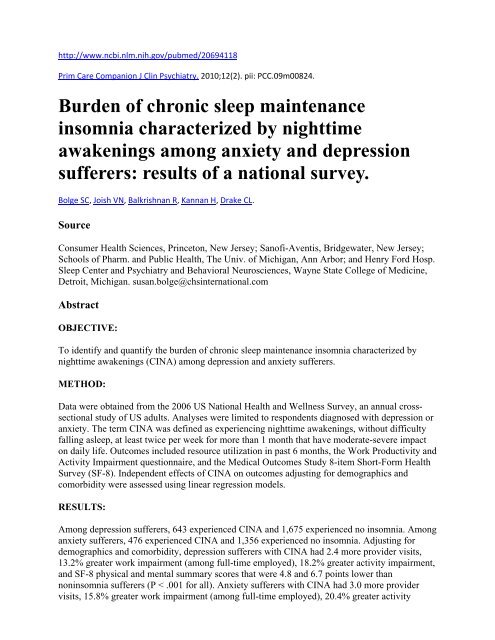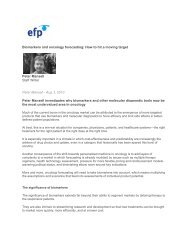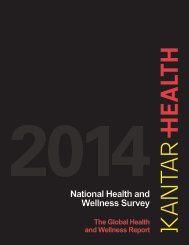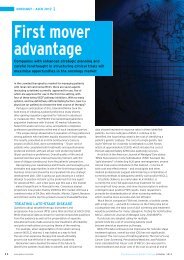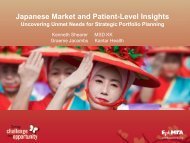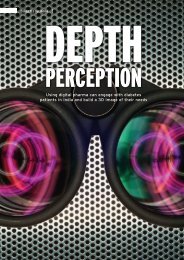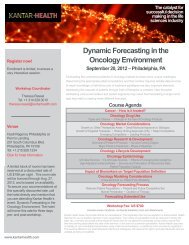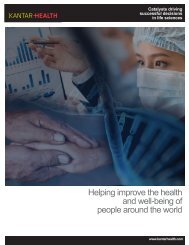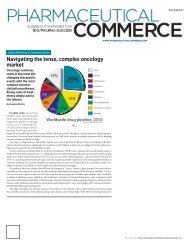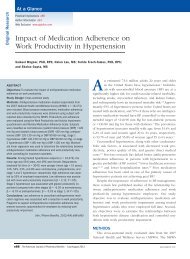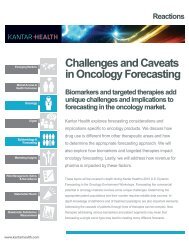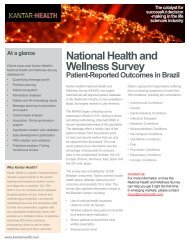Burden of chronic sleep maintenance insomnia ... - Kantar Health
Burden of chronic sleep maintenance insomnia ... - Kantar Health
Burden of chronic sleep maintenance insomnia ... - Kantar Health
You also want an ePaper? Increase the reach of your titles
YUMPU automatically turns print PDFs into web optimized ePapers that Google loves.
http://www.ncbi.nlm.nih.gov/pubmed/20694118<br />
Prim Care Companion J Clin Psychiatry. 2010;12(2). pii: PCC.09m00824.<br />
<strong>Burden</strong> <strong>of</strong> <strong>chronic</strong> <strong>sleep</strong> <strong>maintenance</strong><br />
<strong>insomnia</strong> characterized by nighttime<br />
awakenings among anxiety and depression<br />
sufferers: results <strong>of</strong> a national survey.<br />
Bolge SC, Joish VN, Balkrishnan R, Kannan H, Drake CL.<br />
Source<br />
Consumer <strong>Health</strong> Sciences, Princeton, New Jersey; San<strong>of</strong>i-Aventis, Bridgewater, New Jersey;<br />
Schools <strong>of</strong> Pharm. and Public <strong>Health</strong>, The Univ. <strong>of</strong> Michigan, Ann Arbor; and Henry Ford Hosp.<br />
Sleep Center and Psychiatry and Behavioral Neurosciences, Wayne State College <strong>of</strong> Medicine,<br />
Detroit, Michigan. susan.bolge@chsinternational.com<br />
Abstract<br />
OBJECTIVE:<br />
To identify and quantify the burden <strong>of</strong> <strong>chronic</strong> <strong>sleep</strong> <strong>maintenance</strong> <strong>insomnia</strong> characterized by<br />
nighttime awakenings (CINA) among depression and anxiety sufferers.<br />
METHOD:<br />
Data were obtained from the 2006 US National <strong>Health</strong> and Wellness Survey, an annual crosssectional<br />
study <strong>of</strong> US adults. Analyses were limited to respondents diagnosed with depression or<br />
anxiety. The term CINA was defined as experiencing nighttime awakenings, without difficulty<br />
falling a<strong>sleep</strong>, at least twice per week for more than 1 month that have moderate-severe impact<br />
on daily life. Outcomes included resource utilization in past 6 months, the Work Productivity and<br />
Activity Impairment questionnaire, and the Medical Outcomes Study 8-item Short-Form <strong>Health</strong><br />
Survey (SF-8). Independent effects <strong>of</strong> CINA on outcomes adjusting for demographics and<br />
comorbidity were assessed using linear regression models.<br />
RESULTS:<br />
Among depression sufferers, 643 experienced CINA and 1,675 experienced no <strong>insomnia</strong>. Among<br />
anxiety sufferers, 476 experienced CINA and 1,356 experienced no <strong>insomnia</strong>. Adjusting for<br />
demographics and comorbidity, depression sufferers with CINA had 2.4 more provider visits,<br />
13.2% greater work impairment (among full-time employed), 18.2% greater activity impairment,<br />
and SF-8 physical and mental summary scores that were 4.8 and 6.7 points lower than<br />
non<strong>insomnia</strong> sufferers (P < .001 for all). Anxiety sufferers with CINA had 3.0 more provider<br />
visits, 15.8% greater work impairment (among full-time employed), 20.4% greater activity
impairment, and SF-8 physical and mental summary scores that were 5.4 and 7.6 points lower<br />
than non<strong>insomnia</strong> sufferers (P < .001 for all).<br />
CONCLUSIONS:<br />
Among depression and anxiety sufferers, CINA in relative isolation was associated with a<br />
significant negative impact on health care utilization and its associated costs, health-related<br />
quality <strong>of</strong> life, and work productivity.<br />
PMID: 20694118 [PubMed]<br />
PMCID: PMC2911002


